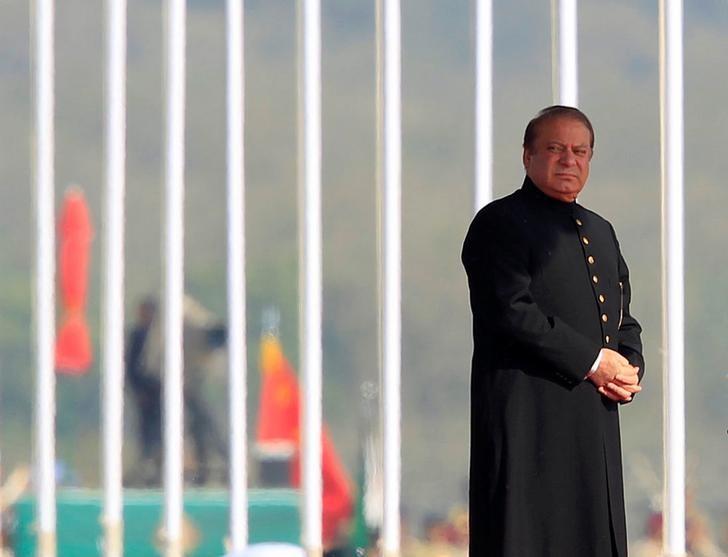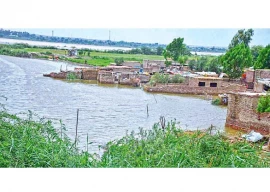
"I am confident that with OBOR in place, we would be able to turn the tide of these threats," the prime minister said in his statement at the first session of Leader's Roundtable, themed 'Policy Synergy for Closer Partnership' at the Belt and Road Forum here at the International Conference Centre at Yanqi Lake.
The prime minister said the new OBOR family and the wider international community should coordinate and synergise their initiatives to create and enhance the space for cooperation.
PM said that all the countries of the region should understand that the dream to prosper cannot be fulfilled unless borders are made safe.
Looking down the One Belt, One Road
“We want better relations with all our neighbours but they also need to reciprocate the same understanding. The countries that will want to join CPEC will be able to do so with the consent of China and Pakistan,” he added.
The prime minister said that a record of Rs2,000 billion rupees were being invested on infrastructure, which should be valued.
“Pakistan is changing. Projects are completing fast, including LNG plants and coal projects.
“The chief ministers of all the four provinces are present here and discussing development which is a rare scene showing unity in Pakistan,” he stressed.
Pakistan, India spar over China’s One Belt One Road initiative
He stressed dialogue and communication with nations outside the belt-road routes as necessary to dispel apprehensions.
Nawaz said Pakistan strongly favours cooperation and synergetic partnerships across regions for socioeconomic development and human prosperity.
He emphasised on policy synergy at the level of international bodies and mentioned that several national planning bodies, the United Nations, international conferences and regional organisations had developed plans and initiatives on global issues and established partnerships with OBOR.
Most importantly, he said the Bretton Woods institutions and the Asian Infrastructure Investment Bank should deepen their cooperation in knowledge-sharing, development financing and country-level coordination through cohesive institutional interaction.
One belt, one road: Xinjiang keen to develop ties with neighbouring countries
The Prime Minister said the forum was an opportunity to explore ways to enhance collaboration under the banner of the "One Belt-One Road" initiative, deepen cooperation, and review the progress we have made so far.
He described it as an important factor as the "very nature of OBOR requires synergetic endeavour, constant appraisal, and closely coordinated policies."
The premier said the world's economy was showing the first signs of improvement and there were credible forecasts that global trade and commerce would strengthen. However, he pointed out that it was not known how long this recovery would last because of its many vulnerabilities.
Nawaz said the two main trends competing in the global economy were advocacy for protectionism; and an increasing call for greater economic collaboration for sustainable development.
China stresses security needs for new Silk Road initiative
He said under the China-Pakistan Economic Corridor banner, Pakistan had made phenomenal progress in a short span of time through active participation in the areas of infrastructure, energy, industrial zones and telecommunications.
Nawaz then called for addressing four areas that require more focus. He called for reviewing overall progress, as all stand to benefit from early harvest projects. He stressed more synergy in development strategies both at the regional and international levels.
He stressed that this initiative must continue to deliver ‘win-win’ outcomes, adding that "all should win. All should succeed."
South Asian countries need more regional connectivity: Ishaq Dar
He also called for building on the solid foundations of OBOR to make it a living, growing and organic partnership.
"We applaud China for taking this historic initiative, which now has the complete ownership of all participating countries," he said.
Prime Minister Nawaz Sharif said Pakistan was focusing on synergy at three levels— harmonising national development plans with CPEC, closely coordinating with China for planning and implementation, and liaising with international financial institutions for policy alignment.
Meanwhile, Chinese President Xi Jinping criticised protectionism at the summit as a champion of globalisation, but some European nations challenged Beijing to address concerns about its own trade practices.
China-Pakistan Economic Corridor: ‘Long-term plan’ to be inked soon
Xi addressed almost 30 leaders on the second day of a forum on his new Silk Road plan, a huge infrastructure project intended to revive ancient land and sea trade routes from Asia to Europe and Africa.
"Globalisation is encountering some headwinds," Xi told leaders from countries ranging from Spain to Turkey, Russia and Pakistan at a convention centre near the Great Wall on the outskirts of Beijing.
"We need to seek results through greater openness and cooperation, avoid fragmentation, refrain from setting inhibitive thresholds for cooperation or pursuing exclusive arrangements, and reject protectionism."
Terrorist attacks: Nawaz moves to allay Chinese leadership’s concerns
He compared countries to "swan and geese" that can "fly long and safely through winds and storms because they move in tandem and help each other as a team".
The Chinese leader used the international gathering to promote his signature foreign policy project, the One Belt, One Road initiative.
He later announced that the two-day summit reached "broad consensus" on the project and that China will host a new forum in 2019.
MoUs
Pakistan and China signed various agreements and memorandum of understandings on making Gwadar a world class modern port city.
The signing ceremony was held in the Ministry of Commerce, Peoples Republic of China and was witnessed by the Minister for Planning, Development and Reform Professor Ahsan Iqbal and Chief Minister Balochistan Sanaullah Zehri.
Both the sides signed the contract and implementation minutes of Gwadar Master City Plan. The parties also signed implementation minutes of Gwadar Eastbay Expressway.
Pragmatic politics: K-P, Sindh chief ministers accompany PM to China
Ahsan Iqbal, while speaking on the occasion, said that Gwadar, a jewel of Pakistan, is being built at par with port cities like Singapore and Hong Kong.
“As the gateway to CPEC, it has already started attracting the interest of investors and would become an international smart port city soon,” he added.
Leaders of both the countries also signed MoU on Leveraging Special Economic Zones to capture the Window of Opportunity for Structural Transformation in Pakistan.
The MoU was signed by Project Director CPEC, Hassan Daud Butt and Professor Justin Yifi Lin, the Director Center for New Structural Economics (CNSE), Peking University.

1725784957-0/Tribune-Pic-(17)1725784957-0-165x106.webp)
1724760612-0/Untitled-design-(12)1724760612-0-165x106.webp)














COMMENTS
Comments are moderated and generally will be posted if they are on-topic and not abusive.
For more information, please see our Comments FAQ